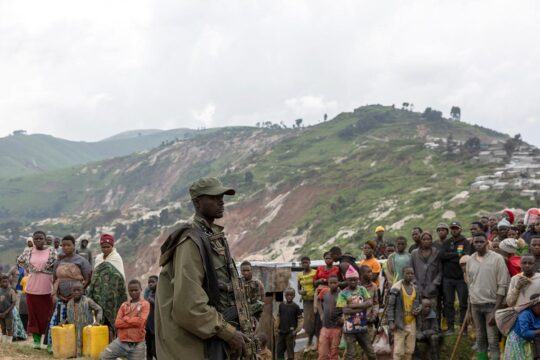The army sealed off a section of DR Congo's second city and carried out mass arrests of young men Thursday, residents said, as talks to try and defuse the country's explosive political crisis were set to continue.
Protests and deadly clashes have erupted in the vast country over President Joseph Kabila's refusal to step down at the end of his mandate on December 20.
The army sealed off the Matshipisha-Gbadolite neighbourhood of Lubumbashi from 5am (0300 GMT), five residents of the city told AFP.
On Wednesday the governor of Haut-Katanga province, Jean-Claude Kazembe, was forced to flee as stones were thrown at him when he tried to visit Matshipisha on a "peace march" aimed at demonstrating that the authorities were in control there following deadly violence on Tuesday.
Police said a total of 22 people were killed Tuesday in clashes in Kinshasa, Lubumbashi in the southeast, and Matadi and Boma in the west.
They said eight of the deaths were in Matshipisha, where 47 people were also injured.
Human Rights Watch has placed the total death toll at 26.
"The army has sealed off the district and carried out arrests" of young men and adolescents, said one resident.
"There are soldiers all along the road" that surrounds the neighbourhood, a resident of an adjacent district said by telephone, adding that soldiers could be seen "going house to house looking for young people".
"They arrest all men, with or without identity documents. They put them in trucks to take them off in an unknown direction," another resident said, adding that two adolescents and a young man were arrested in his area.
"I saw three trucks filled with young people," said another resident.
Capital of Haut-Katanga, Lubumbashi is the fiefdom of an opposition leader in exile, Moise Katumbi.
Talks to end the political crisis headed by the Episcopal Conference, CENCO, resumed on Wednesday after breaking up at the weekend with no progress. CENCO chairman Monsignor Marcel Utembi appealed for a deal by Christmas.
The mainstream opposition headed by 84-year-old Etienne Tshisekedi has called for "peaceful resistance" from the country's 70 million people, pinning its hopes on a deal at the negotiating table.
But in what Kabila's opponents dubbed a provocation, a new government was announced overnight Monday.
DRC has never witnessed a democratic transfer of power following polls since independence from Belgium in 1960.
The president has been in office since his father Laurent Kabila's assassination in 2001. He was elected in 2006, and again in 2011.
Two decades ago, the country collapsed into the deadliest conflict in modern African history. Its two wars in the late 1990s and early 2000s dragged in at least six African armies and left more than three million dead.



